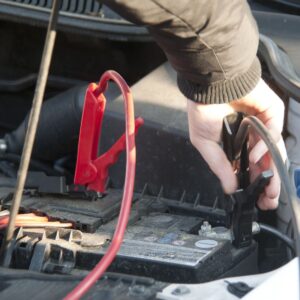How long does it take to charge a cart battery? If you’re looking for a quick and straightforward answer, you’ve come to the right place. Charging a cart battery can vary depending on multiple factors, but typically, it takes around 8 to 12 hours to fully charge a cart battery. However, it’s important to note that this timeframe can differ based on the battery’s capacity, charger type, and other environmental conditions. In this article, we will delve deeper into the factors affecting charging time and provide you with useful insights on optimizing the charging process for your cart battery. So, let’s get started!
How Long Does It Take to Charge a Cart Battery?
When it comes to electric golf carts or vehicles, one of the most common questions is how long it takes to charge the battery. The charging time can vary depending on several factors, such as the battery capacity, charger specifications, and the existing charge level of the battery. In this article, we will explore the different aspects that affect the charging time of cart batteries and provide some helpful insights.
Battery Capacity and Charger Compatibility
The first factor that determines the charging time of a cart battery is its capacity. Golf cart batteries typically come in various capacities, ranging from 36 volts to 72 volts. The higher the voltage, the longer it may take to charge the battery fully. Additionally, the charger’s compatibility with the battery is crucial. Using a charger that is specifically designed for your cart battery’s voltage and capacity will optimize the charging process and reduce the time it takes to complete.
Charger Output and Amperage
The charger’s output power, measured in amps, is another key factor in determining the charging time. A higher amperage rating means the charger can deliver more power to the battery, resulting in a faster charging time. Typical golf cart battery chargers have output ratings ranging from 10 amps to 25 amps. It’s important to note that using a charger with a higher amperage rating than recommended for the battery can cause damage, so it’s crucial to follow the manufacturer’s guidelines.
Example:
Let’s consider an example to understand the relationship between battery capacity and charger amperage. Suppose you have a 48-volt battery with a capacity of 200 amp-hours (Ah). If you use a 10-amp charger, it will take approximately 20 hours (200 Ah / 10 amps) to fully charge the battery. However, if you switch to a 20-amp charger, the charging time will be halved to around 10 hours.
Existing Charge Level
The current charge level of the battery also plays a role in the overall charging time. If the battery is completely drained, it will take longer to charge compared to a battery that is partially discharged. It’s generally recommended to avoid completely draining the battery to maximize its lifespan and reduce charging time. Regularly recharging the battery after each use or when it reaches around 50% charge is an effective practice.
Environmental Factors
The charging time can also be affected by environmental factors such as temperature and humidity. Extreme temperatures, both hot and cold, can influence the battery’s performance and the charging process. Ideally, charging the battery in a moderate temperature range of 50°F to 80°F (10°C to 27°C) is recommended for optimal results. High humidity levels can also affect the battery’s performance, so it’s essential to store and charge the battery in a dry environment.
Charger Quality and Efficiency
The quality and efficiency of the charger itself can significantly impact the charging time. Higher-quality chargers tend to have advanced charging algorithms and features such as temperature compensation, which optimize the charging process. These chargers can adjust the charging voltage and current based on the battery’s needs, resulting in a faster and more efficient charge. Investing in a high-quality charger that is compatible with your cart battery is a wise choice for both faster charging and long-term battery health.
Battery Condition and Age
The condition and age of the battery can also influence the charging time. Over time, batteries can lose their capacity to hold a charge, resulting in longer charging times. Regular maintenance and periodic battery checks are essential to ensure optimal performance and efficient charging. If you notice a significant increase in charging time or a decrease in battery performance, it may be an indication that it’s time to replace the battery.
In conclusion, the charging time of a cart battery depends on various factors, including battery capacity, charger compatibility, charger output, existing charge level, environmental conditions, charger quality, and battery condition. While it’s challenging to provide an exact time frame for charging, considering these factors will help you estimate the approximate time required. Remember to follow the manufacturer’s guidelines and invest in a high-quality charger to ensure both faster charging and prolonged battery life for your electric cart.
Frequently Asked Questions
How long does it typically take to charge a cart battery?
The charging time of a cart battery depends on several factors, including the battery size, the charger’s power output, and the battery’s current charge level. On average, it can take anywhere from 4 to 8 hours to fully charge a cart battery.
Does the age of the cart battery affect the charging time?
Yes, the age of the cart battery can impact the charging time. Older batteries might take longer to charge compared to newer ones, as they may have reduced capacity and efficiency. It’s important to consider the battery’s age when estimating the charging duration.
Can charging a cart battery for an extended period damage it?
No, charging a cart battery for an extended period typically does not damage it. Most modern chargers have built-in mechanisms to prevent overcharging. Once the battery reaches full charge, the charger will automatically switch to a maintenance or trickle charge mode to avoid any harm to the battery.
What are some tips to optimize the charging time of a cart battery?
To optimize the charging time of a cart battery, you can follow these tips:
– Make sure the charger is compatible with your cart battery and has the appropriate power output.
– Ensure the battery connections are clean and secure to minimize resistance.
– Avoid deep discharges, as they may require longer charging times.
– Charge the battery in a well-ventilated area to prevent overheating.
– Follow the manufacturer’s recommended charging guidelines for best results.
How can I estimate the charging time for my specific cart battery?
To estimate the charging time for your specific cart battery, you can refer to the battery’s amp-hour rating and the charger’s amp output. Divide the battery’s amp-hour rating by the charger’s amp output to get an approximate charging time. Keep in mind that this is just an estimate, and actual charging times may vary.
Can using a higher-power charger reduce the charging time of a cart battery?
Using a higher-power charger may reduce the charging time of a cart battery. However, it is crucial to use a charger specifically designed for your battery to prevent overcharging or damage. Consult the manufacturer’s recommendations or seek professional advice before using a higher-power charger.
Final Thoughts
The time it takes to charge a cart battery depends on several factors such as the battery’s capacity, charger type, and current charge level. On average, it can take anywhere from 4 to 12 hours to fully charge a cart battery. Rapid charging systems can significantly reduce this time, allowing for a full charge in as little as 2 hours. It’s important to consider the charger’s voltage and amperage to ensure optimal charging speed. Regular maintenance and proper charging habits, like avoiding deep discharge, can extend the battery’s lifespan and optimize charging efficiency. So, how long does it take to charge a cart battery? The answer varies, but with the right charger and maintenance, you can keep your cart running smoothly.


